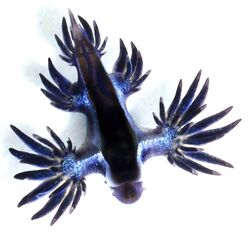Biology:Glaucus marginatus
| Glaucus marginatus | |
|---|---|

| |
| Scientific classification Error creating thumbnail: Unable to save thumbnail to destination
| |
| Domain: | Eukaryota |
| Kingdom: | Animalia |
| Phylum: | Mollusca |
| Class: | Gastropoda |
| Subclass: | Heterobranchia |
| Order: | Nudibranchia |
| Suborder: | Cladobranchia |
| Family: | Glaucidae |
| Genus: | Glaucus |
| Species: | G. marginatus
|
| Binomial name | |
| Glaucus marginatus (Reinhardt & Bergh, 1864)
| |
| Synonyms[1] | |
| |
Glaucus marginatus is a species of small, floating, blue sea slug; a pelagic (open-ocean) aeolid nudibranch; a marine opisthobranch gastropod mollusc in the family Glaucidae.[1][2] This species is closely related to Glaucus atlanticus, and is part of a species complex (Informal clade Marginatus) along with Glaucus bennettae, Glaucus thompsoni, and Glaucus mcfarlanei.[3] Like Glaucus atlanticus, it is commonly known as a blue dragon.[4]
Description
This nudibranch is dark blue, and in many ways it resembles a smaller version of Glaucus atlanticus. However, in this species the cerata are arranged in a single row in each arch.[citation needed]
While G. atlanticus is up to 3 centimetres (1.2 in) long, G. marginate is only about 1.3 centimetres (0.51 in) long, and its tail is shorter than its cousin. The species has a light and dark blue foot.[4]
Distribution
This species is pelagic, and can be found in the Pacific Ocean.[citation needed]
While they do not usually inhabit coastal regions, hundreds of the creatures were observed washing up on one of the Sydney North Shore beaches, near Long Reef, in February 2021.[4]
Habitat and behaviour
These small nudibranches float upside down on the surface tension in temperate and tropical seas. They eat colonial cnidarians such as the Portuguese man o' war[2] (a.k.a. bluebottle, or Physalia utriculus), blue buttons (Porpita porpita), and the by-the-wind sailor (Velella velella).[4]
References
- ↑ 1.0 1.1 "Glaucus". WoRMS. World Register of Marine Species. http://www.marinespecies.org/aphia.php?p=taxdetails&id=534054.
- ↑ 2.0 2.1 Valdés A. & Campillo O.A. (2004) Systematics of pelagic aeolid nudibranchs of the family Glaucidae (Mollusca, Gastropoda). Bulletin of Marine Science 75(3): 381–389.[1]
- ↑ Churchill C.K.C, Valdés A. & Ó Foighil D. (2014) Molecular and morphological systematics of neustonic nudibranchs (Mollusca : Gastropoda : Glaucidae : Glaucus), with descriptions of three new cryptic species. Invertebrate Systematics 28(2): 174-195.[2]
- ↑ 4.0 4.1 4.2 4.3 Salleh, Anna (12 February 2021). "Bizarre 'blue fleet' blows onto Australia's east coast". Australian Broadcasting Corporation. https://www.abc.net.au/news/science/2021-02-13/bizarre-blue-fleet-blows-onto-australias-east-coast/13139456.
Sources
- Bergh, L.S.R. (1860). Om Forekomsten af Neldefiim hos Mollusker. Vidensk. Meddel. Naturh. Foren. Kjöbenhavn, p. 309-331, pl. 8.
- Burn R. (2006) A checklist and bibliography of the Opisthobranchia (Mollusca: Gastropoda) of Victoria and the Bass Strait area, south-eastern Australia. Museum Victoria Science Reports 10:1–42.
- Australian Museum Online sections - sea slug forums
Wikidata ☰ Q3003897 entry
 |

